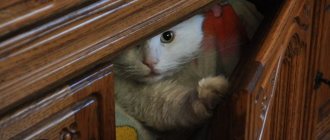Sometimes it is difficult for a person to understand the habits of his pet. And most often, when we notice changes in his behavior, we begin to worry. What if your pet starts going to remote places throughout the day? Is this a feature or should we sound the alarm? Let's figure out when and why a cat may start hiding in dark places.
Signs of a physical illness
Although animal psychologists are sure that in most cases, hiding in a secluded place is associated with the character of the cat, one should not discount such an unpleasant factor of such behavior as the presence of pathological processes in the body. This is especially true in cases where the habit arose suddenly, although the cat had not done anything like this before. That is why the owner must know which behavioral reactions are characteristic of his animal and which are not.
Veterinarians advise owners who are concerned that their furry friend has begun to hide in a dark corner to pay attention to such painful symptoms that appear in parallel, such as:
- The animal does not eat anything for a long time.
- Uncontrollable thirst or, conversely, the pet practically does not drink water.
- The pet began to sleep for a long time.
- Problems with the gastrointestinal tract in the form of diarrhea.
- The cat is vomiting severely.
- The appearance of the coat deteriorates, loses color, and the fur becomes lumpy or falls out.
If the owner notices one of the above signs, which has arisen in conjunction with the fact that the cat is trying to hide away from prying eyes, then it is necessary to urgently take him to a veterinary clinic for an examination.
Why do cats hide under the blanket?
Contents hide
Cats are famous for their oddities and quirks. What places do house purrs not find themselves in? They are especially inventive when looking for a suitable place to sleep. Offhand: this is a bookshelf, a washing machine, a sink, and a laptop keyboard. And some mustaches go straight to the master’s bed, and strive to bury themselves in the blanket. Isn't it hot for them there, by any chance? What considerations motivate our furry pets?
Take an example from the owner. Firstly, cats are very observant, and their owners are constantly under their control. Secondly, cats are territorial. They love to show who is the real owner of the house or apartment, and who is sheltered here out of mercy. Purrs see how their owners go to bed, covering themselves with a blanket. The grimaces of pleasure and happiness on the faces of loved ones also do not escape their watchful gaze: a time of calm and healthy sleep lies ahead. Cats climb under the blanket out of spite and the desire to once again emphasize that everything around is mine. And one more thing: the owner likes to sleep under a blanket, why not try it yourself?
The closeness of a loved one. Many cats are generally accustomed to sleeping in their owners' beds. This solution has many advantages: it’s warm, comfortable, safe, and you can get your share of affection at night. The cat happily lies down next to its adored owner. And she doesn't mind being covered with a blanket.
Excellent shelter. Now let's imagine the situation. Work, pressure, nerves, management sets some impossible tasks. How nice it would be to find yourself at home and get away from all your problems at once, just hiding under the covers! Cats follow much the same logic. The house is bustling, noisy and restless. Another picture is under the blanket; you can't be heard or seen. You can rest and relax in peace. And become invisible for a while.
Anxiety or stress. Cats are very sensitive, vulnerable animals. You move the bowl of water twenty centimeters to the side, and the pet will begin to experience this event. Stress is really well tolerated under the covers. A thick, cotton blanket. It would seem that such a blanket would crush a cat with its weight. But no: it turned out that a heavy blanket with its monumentality has an excellent calming effect.
"Bush Dwellers" Colleagues from PAWS Chicago proposed an interesting classification of cats. In their opinion, all cats in the world choose one of three suitable habitats. There are “tree lovers” (they always climb somewhere high, on a tree, cabinet or shelf); “beach lovers” (prefer open spaces, do not hide anywhere and do not hide from anyone); “bush lovers” (like to hide, but do not like to climb high). For example, they will crawl under the bed. While outside, they will climb into some bush. Or they will prefer a window sill, merging with indoor plants in pots. So - your furry friend may turn out to be a “bush dweller”. The bed is low, when there is a need to hide, a blanket will always help.
Bad feeling. Now let’s put aside our humorous tone. If your once sociable cat suddenly starts seeking solitude and hiding, this is not a good sign. Cats usually hide their pain from their owners until the last minute, preferring to lie aside. You find your pet, and he lies and purrs. Alarm signal: cats purr both from happiness and pain. If at the same time you notice such phenomena as diarrhea, nausea, or the animal refuses to feed or drink, immediately make an appointment with a veterinarian. It is better to notice the ailment at an early stage in order to treat it effectively.
Original : Why Does My Cat Burrow Under The Covers? Author : Carmen Angelica. Source : cuteness.com Photo: pixabay.com
Psychological discomfort
Cats do not have a strong nervous system, so they are extremely vulnerable to stress disorders. If the owner has wondered why the cat is hiding under the sofa or in the closet, then the answer to this may be strong nervous experiences that the animal has recently undergone. These include:
- moving to a new place of residence, home renovations or long travel;
- sometimes the reason for hiding from the owner is a trip to the veterinarian, after which the cat stops trusting his “boss”;
- the appearance of a new pet, child or simply a stranger on the cat’s “territory”;
- complete lack of communication between the cat and the immediate owner;
- often cats hide because one of the family members treats them badly;
- If a cat escaped from home, but was returned back, then it needs some time to recover from the stress it experienced. As a result, she may hide under the bed or just sit behind a chair. This is nothing unusual, just give her time to adapt.
The owner of the animal must clearly understand that prolonged exposure to stress can cause various pathological processes in the cat’s body that negatively affect its health. First of all, the stomach and heart suffer; over time, the immune system weakens, and this makes the entire body vulnerable. Therefore, you need to save your pet from nervous shock as quickly as possible.
What to do if the cat hid in a secluded corner?
If a cat is afraid of everything, the provoking factor of fear and stress should be eliminated, since this condition leads to cardiovascular diseases. When a cat hides under a blanket, you need to give him the opportunity to warm up, especially an old pet. A hidden cat should be given comfortable conditions at the sight of guests - taken to another room, placed there with bowls of food and water, and a tray. It is advisable to periodically visit your pet, pet it and talk calmly.
READ How to understand that a cat has given birth to all kittens signs of the end of labor
When the reason why a cat is looking for a secluded place is shyness, the owner should not punish the animal, but talk to it kindly, even if the person is upset by the pet’s behavior. When cats hide their kittens, this means that something is bothering the pet, so the owner needs to establish the cause and eliminate it. If animals are sick and hiding, it is necessary to show them to a veterinarian, who will identify the disease and prescribe treatment.
Pregnancy
Pregnant cats sometimes behave very strangely. However, it is important to know that during this period their instincts, laid down by nature itself over thousands of years of evolution, become more acute. In particular, the expectant mother begins to take care of kittens even before the moment of their birth. This is expressed in the form of the fact that she is actively looking for a secluded nest where no one will disturb her.
Caring owners should foresee this moment and arrange such a nook for the animal. The ideal option is a regular cardboard box lined with warm material at the bottom. Such a measure will save owners from searching in the future for squeaking kittens, which the fluffy beauty will hatch in the most inaccessible place.
During pregnancy, cats often become irritable and aggressive; they can meow loudly and even hiss at the owner. Therefore, it is better to save them from the annoying attention of children, as well as loud sounds, so as not to once again disturb the animal, which is already on the verge of nervous exhaustion.
Birth in the den
The desire to find a secluded, safe place and build a “nest” there is typical for pregnant females preparing to give birth to babies.
They are guided by the strongest maternal instinct, since in nature a weakened mother in labor and her defenseless cubs are easy prey for other predators.
The bedroom, in which human owners sleep so peacefully, is regarded by domestic cats as the safest area of the apartment and therefore can make a den for childbirth in the closet with clothes or directly in the bed.
Behavioral precursors to lambing are:
- animal anxiety;
- refusal of food;
- alarming meow.
Some cats refuse to give birth in their house, demanding the presence and help of a person they trust. Sometimes a cat can bring newborn kittens into the owner's bed that she gave birth to in another place.
Age
If at an early age a cat runs away to dark places because it is easier to take the owner by surprise, then with older animals the situation is not so clear. A decrepit pet loses its senses, it is no longer attracted to active games and noise, so it is not surprising that it wants to sleep away from all the fuss.
Be respectful of your old pet's needs. He needs more time to recuperate, so try not to make noise in the place where your tailed friend prefers to rest. Veterinarians note that if an elderly animal is not given plenty of rest, it will significantly shorten its life.
Warm place
If the house is cool, the pet will look for a way to warm up. Cats love warmth, so they often sit on central heating radiators or appliances that have become hot from work. They often curl up into a ball and settle among the soft folds of tissue, limiting the space around them.
The desire to crawl under the side of a sleeping person or lie on his chest can also be dictated by the search for a source of heat.
Hairless cat breeds, for which room temperatures below +25°C are uncomfortable, especially need warmth.
Correction methods
So, above it was described in detail why a cat hides in dark places at home. Now it’s worth moving on to questions about how to correct this behavior or make it less risky for the animal. In this regard, experts offer a number of effective recommendations, depending on the cause of the behavioral act:
- In case of stress disorders, it is necessary to completely eliminate the reason that makes the cat want to hide in the far corner. In addition, it is permissible to use light sedatives, presented in the form of tablets and drops, which the pet should drink at a time when stress is especially strong.
- If the cat was hiding due to any disease, and in addition the owner noticed aggravating symptoms, such as diarrhea, vomiting or severe thirst, then it is necessary to take it to a veterinary hospital.
- In cases where the need for privacy in dark places is related to the pet’s character traits, you should arrange a safe and quiet corner for him, where he will feel comfortable when strangers come into the house.
- During pregnancy, provide the expectant mother with a nest, which is quite simple to build from the most common means at hand. Then show it to the cat, let her sniff it and examine it carefully. If she didn’t like the place, then move the structure to the room where she already gave birth or where she often went in search of a safe shelter.
Finally, I would like to say that in most cases there is nothing wrong with hiding a furry friend in secluded places. The owner must treat such “oddities” of his pet with understanding and is obliged to protect him from a fatal accident, expressed in getting into the drum of a washing machine along with laundry or being locked in a closet. If the habit appeared abruptly and is accompanied by painful signs, then it is worth showing your pet to a doctor, this will protect him from the risk of dangerous pathologies.
Signs about cats and cats associated with diseases
It seems incredible, but black purrs can cure diseases and relieve pain for those suffering. It is simply wonderful if an animal voluntarily spends a lot of time at the bedside of a sick person. This furry behavior portends a complete cure.
A cat can warn of an imminent illness by carefully sniffing the owner’s mouth and breath. If this happens, it is best to immediately get tested and undergo an examination.
To determine whether a person can be cured of a serious illness, a purring doctor is brought to him. If a cat runs away from home and does not come back, then there is practically no chance of recovery.











